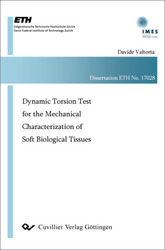| Fachbereiche | |
|---|---|
| Buchreihen (96) |
1379
|
| Nachhaltigkeit |
3
|
| Gesundheitswesen |
1
|
| Geisteswissenschaften |
2367
|
| Naturwissenschaften |
5407
|
| Ingenieurwissenschaften |
1793
|
| Allgemeine Ingenieurwissenschaften | 292 |
| Maschinenbau und Verfahrenstechnik | 862 |
| Elektrotechnik | 686 |
| Bergbau- und Hüttenwesen | 30 |
| Architektur und Bauwesen | 75 |
| Allgemein |
98
|
|
Leitlinien Unfallchirurgie
5. Auflage bestellen |
|
Erweiterte Suche
Dynamic Torsion Test for the Mechanical Characterization of Soft Biological Tissues
Davide Valtorta (Autor)Vorschau
Inhaltsverzeichnis, Datei (24 KB)
Leseprobe, Datei (160 KB)
In this thesis, a novel measurement method for the characterization of the mechanical properties of soft biological tissues is presented. The linear viscoelastic properties are determined through dynamic torsion tests by applying forced torsional oscillations to
soft tissue samples. This work presents the definition of the measurement principle, with the design of torsional resonating sensors and the development of analytical and finite elements methods used for the inverse material characterization. The reliability and limitations of the proposed measurement technique have been assessed with experiments on soft biological materials as well as with synthetic materials.
The viscoelastic response of soft materials is characterized for harmonic shear deformations at high frequencies (1-12 kHz) and small strains (up to 0.2\% nominal strain for the soft biological tissues considered). Experiments are performed using a torsional resonating sensor, hereafter referred to as the torsional resonator device (TRD), which consists of a rod excited to vibrate at resonance, with one end in contact with a material sample. The resonating sensor induces shear waves in the material analyzed. Adherence between vibrating sensor and material sample is ensured by vacuum clamping in the contact area. The response of the material results in changes in the dynamic behavior of the vibrating system sensor + material sample. The damping characteristics and resonance frequency of the vibrating system are inferred from the control variables of a phase stabilization loop. These quantities are then related to the mechanical properties of the material using analytical and finite element models that describe the interaction between sensor and material sample.
In this work, soft biological tissues are assumed to be homogenous, isotropic materials with a linear viscoelastic response. This assumption can be considered suitable to describe the mechanical behavior of bulky internal organs, such as liver or kidney, with no or limited reinforcement by muscular fibers. By controlling the vibration amplitude of the sensor to be within the linear viscoelastic limits, soft tissues can be characterized by a complex shear modulus $G^\ast$, or equivalently by its storage and loss moduli. Due to the characteristics of the sensors proposed in this work, which have the capability to operate at several different torsional eigenfrequencies, the frequency dependent behavior of the complex shear modulus can be investigated. The elastodynamic problem of forced torsional oscillations exerted on a viscoelastic medium, which describes the interaction between the vibrating sensor and the material samples, is solved using analytical and finite element models. The solution of this problem is presented for a variety of contact configurations and samples geometries. The measurement technique can be applied to test samples of undefined geometry, to samples of well defined and finite dimensions, to layered materials and thin membrane-like samples.
The measurement technique was validated through comparative measurements on synthetic material samples with wave propagation methods. Results obtained in tests executed ex vivo on bovine soft internal organs such as liver, kidney and uterus are presented in this work, discussing the possible error sources and uncertainties of the measurement. The measurement method was also applied to the characterization of synthetic materials such as bituminous binders, silicones and rubbers, electroactive polymers, and this demonstrates the versatility of this high frequency rheometry technique. The torsional resonator device (TRD) presented in this work can be considered a useful tool for a fast and non destructive characterization of soft biological materials and can lead to future applications of this technique for in vivo tests for diagnostics purposes.
| ISBN-13 (Printausgabe) | 3867271844 |
| ISBN-13 (Printausgabe) | 9783867271844 |
| ISBN-13 (E-Book) | 9783736921849 |
| Buchendformat | A5 |
| Sprache | Englisch |
| Seitenanzahl | 176 |
| Auflage | 1 |
| Band | 0 |
| Erscheinungsort | Göttingen |
| Promotionsort | Zürich |
| Erscheinungsdatum | 12.03.2007 |
| Allgemeine Einordnung | Dissertation |
| Fachbereiche |
Maschinenbau und Verfahrenstechnik
|








